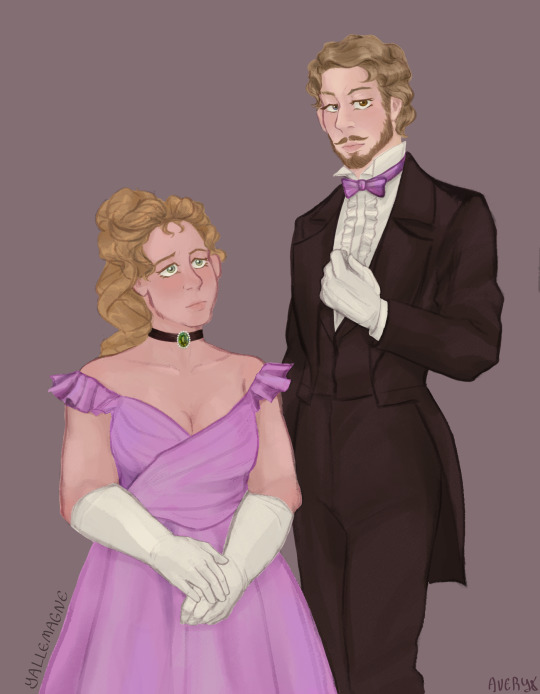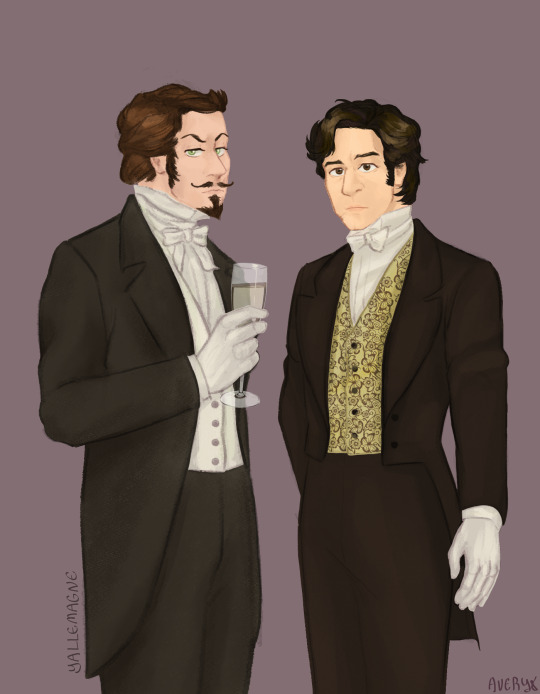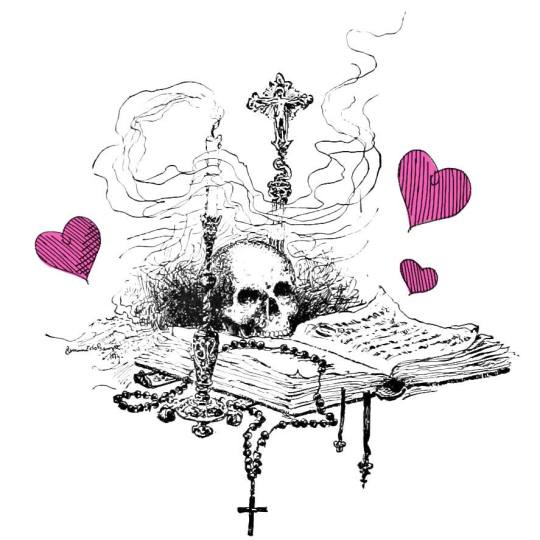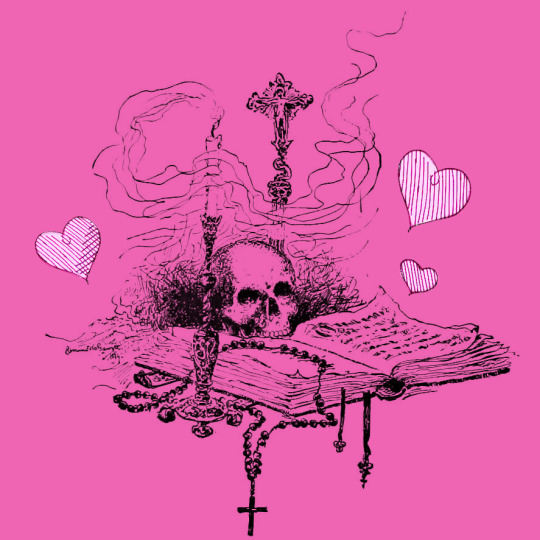#dorian gray weekly
Text
Why, Dorian?!
*SPOILERS*
Why does Dorian kill Basil? We’re not given much of a reason beyond mad passion, a random onset of hatred:
Dorian Gray glanced at the picture, and suddenly an uncontrollable feeling of hatred for Basil Hallward came over him, as though it had been suggested to him by the image on the canvas, whispered into his ear by those grinning lips. The mad passions of a hunted animal stirred within him, and he loathed the man who was seated at the table, more than in his whole life he had ever loathed anything.
We’re not explicitly told why Dorian suddenly feels such hatred for Basil, but here’s my theory:
At this point, Dorian has well and truly gone off the deep end. The state of the portrait makes that clear (and remember, the description we’re given is of the portrait before Dorian murders someone). He’s an evil person. And Basil finally realizes that, once it sinks in that the picture is the same one he painted.
So, what does Basil do? Does he run and scream? Does he curse Dorian? Express regret that he and Dorian ever met? These are the reactions that Dorian is expecting. He’s probably gotten such reactions before, from other people whose hearts he’s broken. Remember, Dorian’s been taught to be cynical by Lord Henry, so, Dorian’s cynicism is deeply-entrenched by now. He values beautiful things because he does not value people, and maybe assumes that everyone is as bad as he is deep-down. I think he expects Basil to hate him.
Instead, Basil encourages Dorian to ask God for forgiveness, to redeem himself. That demonstrates that Basil still loves Dorian, and that Basil himself is willing to forgive Dorian. He’s also not a cynic -- he believes that everyone deserves a chance at redemption, as a Christian is supposed to. And Dorian recoils a bit. “What? I can’t be redeemed, Basil! I’m Evil with a capital E!” And, as if to prove it, Dorian stabs him. Dorian experiences the wild hatred for Basil in that moment because Basil’s reaction is dissonant. It contradicts Dorian’s worldview, and maybe makes him feel guilty for the first time in a while. Rather than deal with that, Dorian kills the last person who sincerely believed he could be better.
Also, I love the image of Dorian idly sniffing the flower and then crushing it in his hand -- he enjoys Basil’s passion for him in an indifferent and detached way, then casually destroys it.
#dorian gray weekly#dorian gray#the picture of dorian gray#basil hallward#oscar wilde#gothic literature#gothic lit#literary analysis#literary criticism
474 notes
·
View notes
Text
Basil: Ok, Dorian's here. I will allow you to talk to him, but you better not influence him with any of your weird morally grey philosophy!
Henry: Alright alright I won't. Geez.
Dorian: Pleasure to meet you Lord Wott-
Henry: Aren't you tired of being nice?
Dorian: Uh-
Henry: Don't you wanna just go apeshit?
Basil: Henry, I swear to God!!!
#dorian gray weekly#the picture of dorian gray#incorrect quotes#henry wotton#basil hallward#dorian gray#memes
527 notes
·
View notes
Text
You know I want you to reblog this so I get more answers
#dracula daily#whale weekly#war & peace and emails#dorian gray weekly#letters from watson#the woman in white weekly#literary letters#voyage of the nautilus#Sun stacks#classic lit#classic literature#tumblr#blue hellsite#polls#Frankenstein#the beetle weekly
335 notes
·
View notes
Text
Something that particularly struck me in yesterday's Dorian Gray chapter is that you can really tell that Wilde is a playwright: so much of his description reads like a (very beautiful) set design layout in a script (noting what kind of furniture is in the room and where, a focus on fabrics, textures, and materials of the surroundings), and he often pays attention to the quality of the light, creating a strong visual element. The way the characters behave is often very visually-striking, too:
"The young man was leaning against the mantelshelf, watching him with that strange expression that one sees on the faces of those who are absorbed in a play when some great artist is acting... He had taken the flower out of his coat, and was smelling it, or pretending to do so."
It's so theatrical in the best possible way— and of course this feeds into the theme of Dorian treating life as art, and the blurred lines between sincerity and performance. It's something I really appreciate about Wilde's writing.
253 notes
·
View notes
Text

i am drowning in emails but jonathan harker takes precedence i’m sorry
#yes i’ve read it before#yes i will prioritize it over all the other ones#it’s just THAT elite#dracula daily#jonathan harker#dd may#substacks#classic lit#frankenstein weekly#whale weekly#letters from watson#dorian gray weekly#<- for a second i lived in a world where ch 13 of dorian gray had never happened :((
311 notes
·
View notes
Text
A few people in the Dorian Gray Weekly tag have observed that Oscar Wilde doesn't make it clear what he wants us to think of Dorian. I'd like to dig into that a bit more, because I think it's true, and fascinating, and weird.
Because if you take everything so far at face value, then Wilde has made it abundantly clear that Dorian is a terrible person. His actions have resulted in a young woman's suicide. He has a visual record in his attic of his moral degradation and that record has become "evil". The picture is covered in "signs of sin", and it's pretty clear that Wilde means that literally. It's not just that Dorian is being spared the realistic physical consequences of his misdeeds, like bags under his eyes after a heavy night out. His sins, which he is unquestionably committing, are visibly altering the appearance of his portrait, like that Roald Dahl quote:
If a person has ugly thoughts, it begins to show on the face. And when that person has ugly thoughts every day, every week, every year, the face gets uglier and uglier until you can hardly bear to look at it.
We don't know exactly what his sins are. But we know how they cause people to act around him:
It was remarked, however, that some of those who had been most intimate with him appeared, after a time, to shun him. Women who had wildly adored him, and for his sake had braved all social censure and set convention at defiance, were seen to grow pallid with shame or horror if Dorian Gray entered the room.
The only reason that there isn't more scandal around him is explicitly because he's rich and attractive. Not because there's any hint that he's sometimes a good person. While Wilde doesn't say "Dorian was evil and his portrait looked evil because he was an evil person who did evil things", he comes pretty damn close to it.
And yet...
Despite all that condemnation, it's hard to come away from reading this novel with the impression that Wilde is actually condemning Dorian's actions, as the commentary in the tag demonstrates. (Which is handy, because this is vibes-based analysis and tricky to prove otherwise).
I think there are two reasons for this. One is the lavish, indulgent descriptions of everything Dorian is doing. The details feel like they're shared in a spirit of appreciation, not judgement. Post-Sibyl, Dorian's crimes are presented in an innuendo-laden, nudge-nudge way that lets you imagine whatever level of debauchery you find titillating. (It's always fun to see where adaptations choose to draw the line here). Dorian's life is shallow, but it's vivid and luxurious - and more than a little enviable. And sometimes it's fun to read about rich people doing bad things!
(Of course, that means that the reader ignores Dorian's sins in favour of his wealth just like his acquaintances do).
The other reason is the weird relationship between Dorian's life and Oscar Wilde's own. Wilde puts what feels like an uncomfortable amount of himself into Dorian - the book that Dorian "could not free himself from", that contributes to his moral degradation, is one of Wilde's own favourite books. Wilde also lived an indulgent, hedonistic lifestyle that took him into sordid parts of London, where he did things that, once revealed, would see him shunned by society, some of which we would still judge harshly.
Wilde was writing for an audience who didn't know as much about his life as we do, but he was already an established celebrity when The Picture of Dorian Gray was published, so I think his readership would see an echo of Dorian's decadence in Wilde himself. Like Basil Hallward, he put a lot of himself into his art. Like Basil Hallward, it revealed more of him than he perhaps intended - but he did intend some of it.
I can't quite imagine writing a character who shares a lot of my interests and enthusiasms, plus some of the worst of my behaviour, and then explicitly describing that character as evil, but that's what Oscar Wilde did. Dorian Gray doesn't feel like it's written in a spirit of self-loathing, but nor does it feel like a demonstration of cognitive dissonance. So I'm no closer to figuring out what the hell is going on here. But for me, the chewy complexity of exactly how Wilde wants us to feel about Dorian - admiring, judgmental, condemnatory, detached - is a significant part of why I enjoy this novel so much.
#dorian gray weekly#oscar wilde#the picture of dorian gray#apologies to my followers for the tonal shift from beetleposting but this was taking up space in my brain and i needed to get it out#and i have an irrational dislike of queuing things
230 notes
·
View notes
Text
So you locked eyes with a guy at a party… and felt something that scared you so you much you tried to run away… but we’re so captivated by him you asked to be introduced anyway… and you see him every day… and he is in all of your art… and you swear you will never meet someone else like him ever again… and you refuse to sell your portrait of him… um, Basil… that sounds a little gay
307 notes
·
View notes
Text
Not joking here if I see any of you be biphobic about Dorian Gray for the Dorian Gray Weekly substack I’m killing a man. Dorian Gray is canonically bisexual and as much as he fucking sucks you can pry my nasty little bisexual cunt from my cold dead hands. If I ever see any of you imply him being attracted to women makes him lesser, or that he’s “actually just gay”, I’m blowing up a building. Okay? Okay.
#doc talks#dorian gray#dorian gray weekly#jekyll and hyde weekly#tpodg#gothic fiction#gothic literature
330 notes
·
View notes
Text


PSA: Rich boys are about to throw down.
#dracula#dracula daily#the picture of dorian gray#dorian gray weekly#lucy westenra#arthur holmwood#lord henry wotton#basil hallward#dracula fanart#dorian gray fanart#fanart#art#digital art
187 notes
·
View notes
Text
I was following along in the Collins Edition of The Complete Works of Oscar Wilde, which has an Introduction by his son Vyvyan Holland. There, Holland says Wilde visited a painter's studio in 1884 and saw the picture of a beautiful young man. He lamented that how even such great beauty would age one day.
The painter answered it would be better for the painting to wither and age and the sitter to always remain as he had been.
The name of the painter?
Basil Ward
#dorian gray weekly#dorian gray#basil hallward#oscar wilde#victorian literature#the picture of dorian gray
106 notes
·
View notes
Text
i'd bet dorian's first kiss was with the portrait and not sybil
#we've made it to my very favorite line in the book#he's so pathetic#the picture of dorian gray#dorian gray weekly
166 notes
·
View notes
Text
For those who are reading Dorian Gray, I just want to emphasize something:
A lot of adaptations make Dorian’s breakup with Sibyl Lord Henry’s fault, either indirectly (through giving Dorian bad romance advice) or directly (taking him to a brothel instead of going to see Sibyl perform). For some reason, adaptations seem really adverse to portraying the breakup as-written, which is a problem, because this is so important.
Dorian’s breakup with Sibyl is entirely his own fault. It’s a sign that Dorian was never really that great of a person, independent of Harry’s influence, and that he’s already cruel before shit starts really going down. It also is a point towards my self-serving theory that the story is not a cautionary tale about hedonism, it is a cautionary tale about taking art too seriously. More on that to come!
#the picture of dorian gray#dorian gray#dorian gray weekly#oscar wilde#gothic literature#gothic lit#literary analysis
295 notes
·
View notes
Text
Love the idea of Henry Wotton and Arthur Holmwood attending the same party and giving each other dagger eyes. I don't know why but it would be fascinating!
Henry "I justify cheating on my wife because we maintain completely separate lives" Wotton vs Arthur "I spiritually married my wife's blood donors" Holmwood FIGHT
#dracula daily#dracula (novel)#the picture of dorian gray#dorian gray weekly#henry wotton#arthur holmwood#thebibi post
162 notes
·
View notes
Text




The first installment of What Manner of Man goes out tomorrow! So if you'd like to read the experiences of an innocent priest sent to a forgotten island and confronted by a seductive vampire — a queer gothic romance sent to your inbox in the form of Dracula Daily-style letters — this is your last chance to sign up before it begins.
At the moment We're at 2960 subscribers, which honestly blows me away. Where did you all come from???
I do wonder, though, if we could possibly get that number up to 3000 before it starts tomorrow? 😈
Sign up here!
#letters from watson#dracula daily#interview with the vampire#carmilla#dracula#dorian gray weekly#whale weekly#midnight mass#jekyll and hyde#jekyll and hyde weekly#Frankenstein weekly
162 notes
·
View notes
Text
I don't know how much longer people will still be checking the Dorian Gray Weekly tag now that the final chapter has been posted today, but I was thinking that it's not until the very end of the novel that one can fully analyze (without spoilers) all the very obvious parallels between the novel and Jekyll and Hyde in terms of themes, narrative structure, turns of phrases, etc. - right down to the central characters' deaths where they both kill themselves and die alone in the very room that holds the secret of their double life while the servants gather in fear and have to find a way to get into the locked room, upon which the true identity of the corpse isn't recognized at first, and yet the corpses show the true nature of both Dorian and Jekyll behind their socially admired facades.
72 notes
·
View notes
Text

133 notes
·
View notes